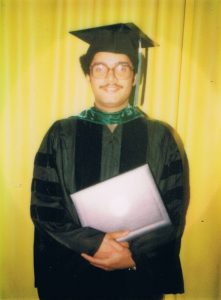June is the month for graduations and commencement speeches. I accomplished the former in 1979 and it’s unlikely I’ll ever be asked to do the latter. I wrote this in 1998 in response to a long-forgotten question my sister-in-law asked and revised it for this blog post.
To all graduates, family members and faculty, welcome. It’s my honor to be here today. I might not be if it was not for persistence, determination, and the fear of being stuck with loans I couldn’t repay if I was unemployed.
First, to the esteemed faculty:
When I applied to medical school, admissions committees wanted applicants who looked good on paper: science degrees, high test scores, ambitious undergraduate years, and largely male. They frequently weeded out those with the characteristics patients wanted in their own doctors, replacing them with what they were most familiar – future Great White Fathers. If those anomalies survived medical school and residency, they were often ostracized and driven out once in practice because they refused to follow the herd and questioned what we did. The heretics among you kept you honest; you needed them to grow. And you have made progress.
Medical school classes have become more diverse. Women made up slightly more than half of applicants and new students in 2017. The FlexMed program at Mt. Sinai’s Icahn School of Medicine in New York has admitted nontraditional students for thirty years. There are fewer white and more Asian-American students admitted, but the percentage of African-American and Hispanic students remains low. A lot of work remains.
There are many different ways to teach and to learn. The creation of medical schools was done, in part, to standardize what was taught and to ensure some semblance of consistency in medical training. But much has been lost confining students to classrooms and expecting them to read volumes of medical literature taken out of context. The old guys used to say, “Look at the patient, not just at the lab tests!” Teaching at the bedside still has a place and cannot be replaced by expensive computer-controlled models or simulations. It can be done with integrity and respect for the patient — and for the student.
Be careful what you say, for the damage might be permanent.
I did a month rotation with a faculty urologist during my junior year of medical school. At the end he wrote “He does not have what it takes to be a physician,” on my evaluation. I should not have been surprised; his over-achieving son, a year ahead of me, had highlighted the entirety of Harrison’s Principles of Internal Medicine – a 1200-page tome – in four colors, and he had purchased his own indirect ophthalmoscope. I was stunned, humiliated, and spent the next six months wondering if he was right, if I should drop out and career for which I was better suited.
Remember the golden rule. Do not “teach” medical students with sarcasm, derision or humiliation. Bitter, cynical students and residents become bitter and cynical physicians. We all suffer for it – patient and physician. If you can’t say something nice, don’t say anything. But it is not that hard to find something good in someone.
Always teach the art along with the science. Teach students and residents to laugh and cry with their patients, to rejoice in the little accomplishments and grieve for the losses.
Above all, teach them the grave responsibility that comes with the profession. This is not shift work; a job to endure until retirement. It should still be viewed as a calling.
To the new graduates:
Even though William Hurt’s movie The Doctor is dated, all beginning medical students should be required to watch. Your patients will be people with weaknesses and vulnerabilities hidden behind their strengths. You share those same weaknesses and vulnerabilities although you are loath to admit that to yourselves, your colleagues and your families. Walk many miles in your patients’ shoes; you will be a better physician for it. Accept that you are not perfect and never will be; your patients already have.
Long gone are the days when a physician hung out a shingle and practiced the way he wanted in an office he owned, before he retired after forty years. I say “he” because back then women physicians were few (and resented). Many, if not all, of you will be employed by a corporation. Be careful and realistic. The perceived security of a steady salary, liberal vacation and “avoiding the business hassles” comes with a hefty price tag. When we trade autonomy for financial security, we end up with neither. Some of my colleagues regretted selling their souls. You will be judged on how much you cost the company, not on how compassionately you treat patients, which may adversely affect the care you provide your patients. You will also be judged on your loyalty to those who sign your paycheck. They expect you to be a “team player,” even when the team bus is headed for a cliff. Or, as one of my former partners asked me, “Why can’t you just take the money and shut up?” Don’t leave your conscience at home.
Managed care is not intrinsically evil, but its implementation has been fouled by greed, callousness and stupidity. It is an imperfect response to the rising cost of health care, an event which has largely been ignored by the medical profession. My predecessors robbed the candy store and left all of us with the aftermath.
People do not trust the health care system; you can help restore that trust. But don’t make promises you can’t keep. Properly managed, there will be care for all. But health care dollars are not infinite. You must choose between want and need; what is desirable and what is necessary. As the Rolling Stones sang, “You can’t always get what you want, but if you try sometime, you just might find, you get what you need.”
Beware of the Golden Handcuffs. Avoid conspicuous consumption and remember money cannot buy happiness. You can’t spend it if you are 6 by 6 in the dirt, and you can’t take it with you. He who dies with the most toys still dies. Keep in mind you will still be making more than 99% of the population. Also remember you told the admissions committee some ridiculous story about going into medicine to help people, not to make a lot of money. If you tell a lie long enough, it becomes the truth, so make it true.
Be kind to nurses, because they can make your life easy or a living hell. They also have your back and may one day prevent you from doing something completely stupid. You owe them far more than those in the administrative suite who often have no idea what you really do.
Be grateful and acknowledge the other people that help you do your job: unit secretaries, housekeeping, maintenance, phlebotomists, transporters, techs. It won’t kill you to smile and say hi. Trust me, they will notice.
Find other things to do with your life. Medicine cannot be your entire universe; you need to strike a balance in your personal life. If not, your spouse may leave you, your kids may hate you or, worse yet, not know you. You will be tempted to ease the pain with drugs and alcohol. Some of you may be driven to suicide–a waste of a good doctor and the taxpayers’ money. You won’t be much good to your patients–and yourself.
Don’t be afraid to pick up a colleague who has fallen. Someday, the favor may be returned. Don’t compete, keep score, or ostracize each other. There isn’t any point.
If you find yourself wondering why you go to work in the morning, it is time to pick another profession. If you never question why you go to work, you made the right choice. This has been an honorable profession. Let’s keep it that way.
Thank you and good luck.

